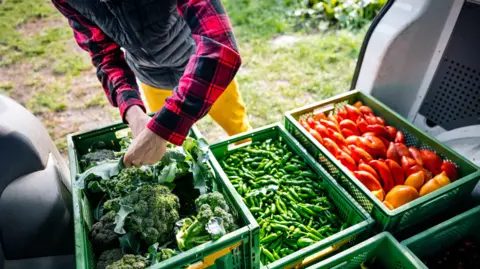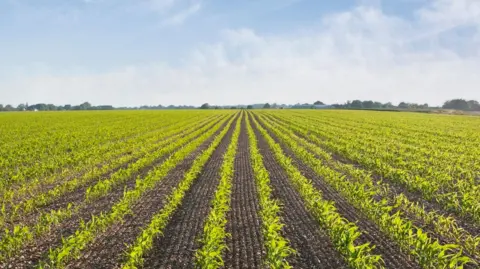Agri-food deal in UK-EU agreement could reduce sea border impact
 Getty Images
Getty ImagesAn agri-food deal that could substantially reduce the impact of the Irish Sea border is set to be part of a new UK-EU agreement.
Prime Minister Keir Starmer will host EU leaders in London on Monday for a summit to "reset" relations.
Negotiations for a deal between the UK and EU are still ongoing hours before the summit is due to be held.
The summit is expected to include an "agreement to agree" on trade issues, including the trade in food and agricultural products.
If a full agri-food deal is finalised, potentially later this year, it could largely eliminate the need for regulatory paperwork and checks on food products being sent from Great Britain to Northern Ireland.
The UK's chief negotiator, European relations minister Nick Thomas Symonds, told the BBC the current Brexit deal on food "just isn't working" for businesses across the UK.
"We know we've had lorries waiting for 16 hours, fresh food in the back not able to be exported because frankly it's just going off, red tape, all the certifications that are required, we absolutely want to reduce that."
 PA Media
PA MediaThe current trade rules for food have the biggest impact in Northern Ireland as it has effectively remained in the EU's single market for goods while the rest of the UK has left.
That means when supermarkets are sending shipments from their distribution centres in Great Britain to Northern Ireland, it is as if they are crossing an international border so require a range of paperwork and other controls.
What's in the new deal?
 Getty Images
Getty ImagesThe UK and EU have previously attempted to ease the flow of goods from Great Britain to Northern Ireland but problems remain.
The new deal is expected to involve the whole of the UK following EU rules on food, with an ultimate oversight rule for the European Court of Justice.
That would eliminate the need for most regulatory checks and controls on food products crossing the Irish Sea as Northern Ireland and the rest of the UK would return to following the same rules.
That would be like the deal Switzerland has where there are no regulatory border controls for trade in agri-food products between that country and the EU.
The Swiss only have this deal because they agreed to follow EU rules almost to the letter, without much say in setting those rules.
'Pragmatic choices'
Thomas-Symonds said the UK government "don't come at this from an ideological perspective, we come from a practical perspective".
"Where it is in our national interest to align on common standards it means taking a sovereign choice. It's about pragmatic choices to make sure businesses can trade more easily."
Shadow Cabinet Office minister Alex Burghart said a Swiss-style deal would return the UK to being a "rule taker" from the EU.
"That is a surrender of some of Britain's sovereignty and we won't stand for it," he added.
The Centre for European Reform (CER), a think tank, said an agri-food deal would not be of "great macroeconomic significance" for the UK as a whole but that Northern Ireland would be a "major beneficiary".
It added: "The closer UK regulations come to those of the EU, the less is the need for border controls on goods crossing the Irish Sea from Great Britain to Northern Ireland."
An agri-food deal would not eliminate the sea border entirely as businesses would still need to make customs declarations to ship products from Great Britain to Northern Ireland.
It is also unclear whether an agri-food deal would cover the trade in plants and veterinary medicines.
Analysis: Unionists size up possible new deal
by Enda McClafferty, BBC News NI political editor
Making up is never easy after such a bruising and bitter break-up but that challenge begins later for Prime Minister Keir Starmer as the UK and EU hold their first bilateral summit since Brexit.
The trick will be to reset relations with Brussels without making it appear like a Brexit retreat.
Both sides are keen to tear down trade barriers and that could see a deal being struck to greatly reduce the impact of the Irish sea border.
But how will unionists approach such a deal?
How do they strike the balance between welcoming a deal that begins to eradicate the border while at the same time undermining the Brexit they championed?
Do they adopt a purist or pragmatic approach?
Read more here on the thoughts of the Democratic Unionist Party (DUP), Ulster Unionist Party (UUP) and Traditional Unionist Voice (TUV) ahead of a possible new deal.
